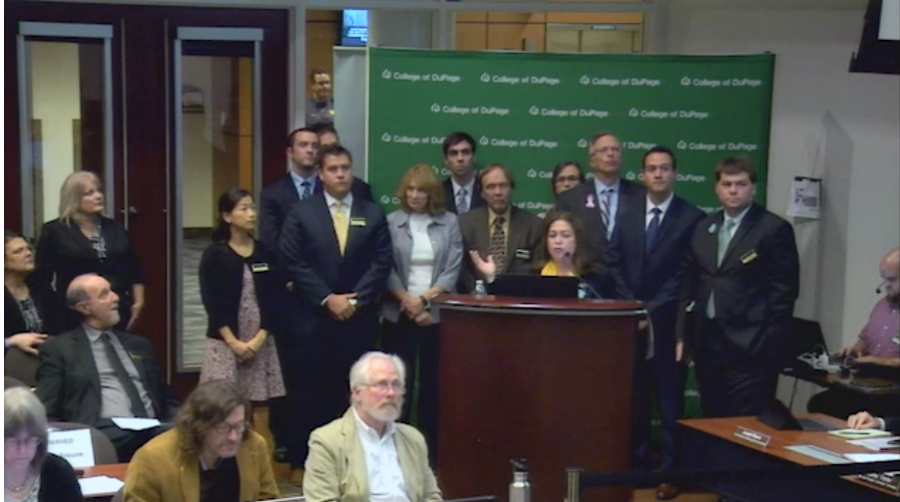College financial officials ‘set the record straight’
Lynn Sapyta, assistant vice president of financial affairs, speaks at the Oct. 16 board of trustees regular meeting.
October 22, 2014
The College of DuPage finance office gave a presentation at the Oct. 16 board of trustees regular meeting in an effort to defend the college’s financial integrity against claims made at previous meetings that its internal controls and spending were out of control.
Twelve financial personnel stood behind Lynn Sapyta, assistant vice president of financial affairs, as she addressed the nature of imprest payments – a subject that has been the center of much debate in previous months.
Under current board policy, all payments valued in excess of $15,000 require approval by the trustees. Payments with a value less than that amount are classified as imprest payments and therefore do not require explicit board approval, although the board does approve the contracts against which many of the payments are made.
In any given month the college can register upwards of 2,400 payments, according to Thomas Glaser, senior vice president and treasurer.
“You can have a range of debate on whether a board should or wants to see every payment that goes through the college. This and past boards have said they want to focus on higher level, more strategic matters,” Glaser said in an interview.
Adam Andrzejewski, the founder of political activist group For the Good of Illinois, addressed these imprest payments at prior board meetings, stating a number of the payments were made in quantities greater than $15,000 and that college administrators were categorizing payments under the imprest account to hide questionable funding from the board.
A document handed out by Andrzejewski at the Sept. 22 regular meeting entitled “Top 10 Oddities of Imprest Accounting Register” was the subject of much of Sapyta’s presentation. The document provides a sample of the college’s line item expense reports received from a Freedom of Information Act request by Open the Books. According to the document, the sample provided is just 10 of over 1,300 double vendor entries of hidden payments within the imprest account.
Sapyta confirmed the document sent by the college in response to Open the Book’s FOIA request was consistent with the copy posted on group’s website. After cross-referencing the imprest payments listed on the Top 10 Oddities with the copy of the FOIA on the website, Sapyta labeled the entire document inaccurate.
“I don’t know why Open the Books would hand out a document like this. I find it totally irresponsible. It is dishonest and unethical to slam the personal integrity of the men and women who stand behind me,” said Sapyta.
Andrzejewski was absent during the presentation but was present during the open comments section of the meeting where he responded to the “40-minute personal attack.”
“We filed a FOIA with the school and in contravention of the FOIA law the school provided a locked PDF with those payments. Our programmers unlocked [the PDF] after five hours of writing code” Andrzejewski said. “During that process, ‘1s’ went in on 1300 accounts. According to Andrzejewski, the accidental insertion of the ‘1s’ caused the inaccurate analysis of the information and the decoded copy was immediately removed from the group’s website.
“I don’t understand – no one understands – what he meant by ‘locked,’” Glaser said. “We sent a PDF file to him so the data could not be changed, just as we would in any other FOIA request. He caught his own error and fixed it on his website, yet he came to the [regular board meeting] weeks later with his oddities handout. He knew it was wrong when he handed it out. This political activist group is trying to create an issue here where there is none.”


















